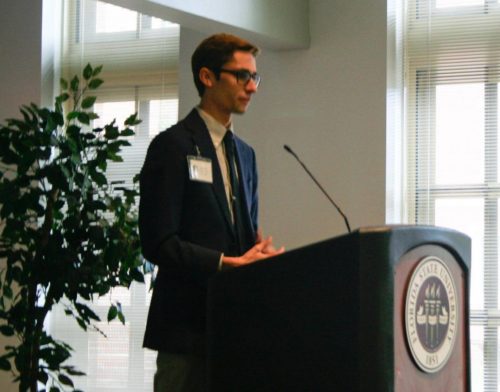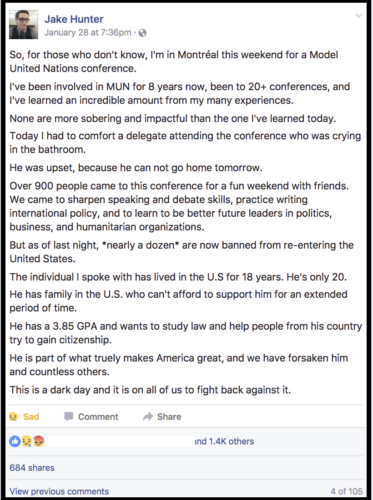The following post is an editorial interview between Aaron Kalafarski and Jake Hunter regarding Jake’s experience at a Model UN conference after expressing his frustrations following the Trump Administration’s Executive Order. The events discussed began on January 24th, 2017 while Jake was attending McGill University’s Model UN conference in Montreal: McMUN.

Jake Hunter speaking as the Secretary-General of Florida State University’s Model UN annual conference.
Information today spreads so quickly through the internet. Thanks to social media sometimes the most unassuming of thoughts can become the most viral. Although Model UN has thousands of participants around the world and has been referenced in movies and shows such as Parks and Recreation (episode title: “The Treaty” 2011), Community (episode title: “Geography of Global Conflict” 20011), Mad Men (episode title: “Favors” 2013), etc. it is still not as well known of an activity as I think it should be. However, as the activity grows, so too will the way Model UN interweaves itself within the fabric of pop culture and other mainstream platforms. Therefore, I am conducting this interview with Jake Hunter to explore his experience with the Trump Administration’s travel bas on refugees as well as understand the growing influence of Model UN on social media and throughout the world.
With that in mind, I’d like to frame this interview around three main topics: First, your reasons behind why you decided to post the facebook status; second, how the events unfolded during and after the Executive Order was signed; and third, what the Model UN community can do in response to this situation.
…Hello Jake!
First of all, thank you for agreeing to do this interview with Best Delegate and for being willing to share your perspective on an issue that has directly impacted the Model UN community as well as the world. To jump right into it, on January 28th, 2017 you made a facebook post expressing your grievances with the Trump Administration for placing a ban on immigrants of 7 countries from being allowed entrance into the United States. Here’s the post:

1. [Aaron] To begin: when you originally posted this facebook status, what was going through your head? Also, were you expecting it to receive the attention that it ended up garnering from the internet?
______
1. [Jake] First of all, thank you for the opportunity to have this interview. Best Delegate has been incredible in their coverage of and support for Model UN. I think all of us veterans can agree that we’ve seen huge steps forward in the popularity and quality of the circuit in recent years and your organization has been an integral part of that, so thank you.
The post was definitely sparked by anger, passion, and frustration. I was actually in the middle of my committee [at McMUN] still, but I was so affected by my experience with this delegate that I knew I had to step out of the room and put my feelings down somewhere. It’d been about 90 minutes since the encounter and I was struggling to get my head back into delegate-mode, even though, ironically enough, my committee was a General Assembly about the refugee crisis.
I knew I had a lot of friends who cared about similar issues, but the potential reach of the post wasn’t in my head at all at the time. I just knew that the experience that I’d had was important and the story needed to be preserved because it was something that I knew would feel real to people- even to those not at the conference.
______
2. [Aaron] Originally your facebook post was only viewable to those who were your friends with your account, why did you later decide to make the post public?
______
[Jake] I originally really didn’t consider potential power of the story at the time. My biggest concern at the time was just trying to share a perspective that I know not enough people get to see- being there first hand to see the impact of broad, catch-all legislation on someone whose life has just been turned completely upside down at no fault of their own. Within an hour of posting I had a couple comments and like four or five private messages asking if I could make it public and by then I’d started to realize that this was too important of an account to tell to just keep inside my social bubble.
______
3. [Aaron] I’d like to shift gears to talk about how events unfolded throughout the conference. First, how did the news of the Executive Order break?
______
[Jake] Well, the order had gone out the day before, on the 27th, but between committee sessions and the Friday night conference social I don’t remember hearing anything about it. I think most everyone else had that same experience. By morning the tone had changed. A lot of people had a chance to slip out of the mid-conference mindset for long enough to notice and a collective feeling of unease and dread started to sink into the walls of the conference.
On Saturday afternoon the McMUN secretariate came into each committee and broke the news to everyone who hadn’t heard yet.
______
4. [Aaron] How did the conference as a whole respond to the situation?
______
[Jake] The McMUN staff did a great job in stressing that they were there to support and assist anyone affected in any way they could. The spread of the news definitely got everyone talking. In a place with inherently internationally diverse roots like Montreal, with a conference where a majority of us present study politics and international affairs, and with so much cultural diversity represented among us, you could definitely tell that the magnitude of the executive order was well-understood.
______
5. [Aaron] What was the response to your post like from people not associated with the conference?
______
[Jake] The outreach afterwards was incredible. Of course a lot of my friends and family were outraged and concerned for the wellbeing of those affected wanted to know if they were going to be able to get back home safely, but the incredible flood of offerings of support from complete strangers was really what shocked me. The morning after I’d shared the story I had a dozen messages in my phone from strangers offering legal or financial support to the students affected. A handful of citizens of Montreal reached out to me and offered a place for people to stay if they had nowhere to go. I had a handful of reporters who’d caught wind of the situation who wanted to know the full story.
It was incredible- truly inspiring really to see complete strangers willing to do anything they could to help these kids. It really eased some of the despair a lot of people felt early on, just by knowing there was such an outpouring of support coming from everywhere.
______
6. [Aaron] How were individual delegates directly and indirectly affected by the Executive Order respond?
______
[Jake] A lot of the delegates that knew they’d probably be directly affected by the Executive Order were quick to shift their focus away from the conference itself and focus on getting back home. Everyone at the conference, staff, head delegates, general attendees- everyone showed sympathy and concern, but of course I know it still hit those affected hard. The good thing about the confusion and helplessness that I’m sure of a lot of them felt was that they were surrounded by a community that was dedicated to being supportive and uplifting in any way they could.I saw several friends of mine at the conference who I’d known to have been very conservative on social issues and immigration outwardly express a change of heart in light of the situation. It was a really powerful experience for everybody involved.
______
7. [Aaron] What are some things that the Model UN community can do to respond to this situation?
______
[Jake] McMUN and everyone involved did an outstanding job in managing the situation and I think a lot can be taken from the whole situation in how a conference and its attendees can respond to a major “real life crisis update”.
I think the most important thing to take away from this experience however, is that so many of the issues we research, write, and debate on are more than just a means to show off our Model U.N. skills. These are real issues that affect real people, and as a community I hope that this helps to remind us of the importance of recognizing the real impact that policy has on the world and individual lives, and reaffirms the commitment that a lot of us delegates have in going on into the professional world with a goal of making a tangible difference in the world through upholding human rights standards.
I’d personally love to see the the circuit as a whole find new ways to celebrate and support that- and practice it through charity and awareness campaigns during conferences and individual club general body meetings whenever possible.
______
8. [Aaron] Thank you for sharing your honest feelings and thoughts on this topic, Jake. It has been an absolute pleasure to share your individually unique perspective weeks following the event and also after receiving so much support from the global community to spread awareness of this issue.
______
[Jake] Thank you Aaron, I’m just happy to have had the opportunity to bring some awareness to a very real issue and to help prop up the amazing Model UN circuit and its compassionate, diverse community.______
______
______
Jake Hunter has been an active member of the Model UN circuit for the past 8 years, previously serving as the director of his high school program, director of programming for Florida State’s World Affairs Program, and Secretary-General of FSU’s Regional Training Conference XXIV in the Fall of 2015. Jake Hunter will be graduating from FSU in the Spring with a degree in International Affairs with a concentration in Public Administration.


